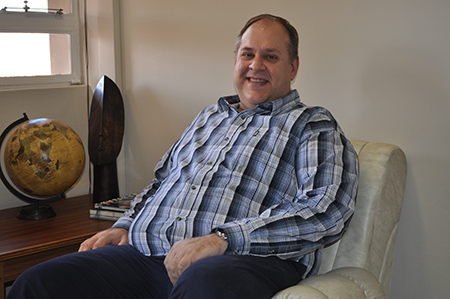The lasting legacy of apartheid is that most South Africans have stayed in their cultural bubbles. "We have never made the real effort to learn about the people we share the country with," explains Prof Henri Bezuidenhout from the North-West University's (NWU’s) School of Economics and one of the country's foremost experts on cultural intelligence.
Henri is the only African to have comprehensive certification from the Cultural Intelligence Center of Michigan in the USA, as well as the Level II Cross-Cultural Competency Certification of Richard Lewis and CrossCulture in the UK.
The last year has seen a spate of culturally insensitive remarks ranging from Helen Zille's tweets regarding, in her opinion, the positive consequences of colonialism to Black First Land First's explicit threats against white journalists. These are but two of numerous examples that have hogged headlines.
According to Henri, South Africans are in need of deeper cross-cultural awareness and understanding. Recent media incidents, from Zille's comments to the Spur saga, highlight the fact that South Africans still have a long way go in deepening our cultural understanding.
Subconscious bias
"All people have an unconscious bias. You judge without knowing you do and those around you do the same. You are socialised to be that way; you have an inherent preference to find and be with people who are the same as you.
Now in South Africa, we have cultures who greatly differ from each other. Knowing this, the question is whether we are going to actively let this bias control us, or work towards rectifying our behaviour. Remember, we all have this subconscious bias, but the sad thing is not all of us want to hear this," Henri says.
The government's one-size-fits-all approach to cultural matters doesn't help either. He concludes that cultural intelligence dictates that success lies in celebrating diversity through mutual understanding, respect and cooperation where the whole becomes bigger than its parts.
Micro-aggressions are expressions of unconscious biases, hardwired cultural biases that are ingrained in all humans. Most companies that have implemented broad-based black economic empowerment have experienced an increase in these aggressions. Unconscious biases are in themselves not racist. However, unawareness of deep-rooted differences in cultures, when expressed as micro-aggressions, becomes racist fairly quickly.
Seeing with each other's eyes
There is also a different picture to keep in mind.
"Our South African society is built according to Anglo-Germanic blueprints and that is what we, as white citizens, are accustomed to. We don't know anything else. Black should also realise that this is the only society white people know. Therefore an understanding of different cultural viewpoints is imperative for this society to live in harmony," says Henri.
"Let's look at our society. Imagine viewing society from a black perspective: everything you see around you was constructed from a white perspective and that is the reality you are confronted with on a 24/7 basis. The way love is depicted on your television set is from a western or Hollywood-inspired viewpoint. Now, let's also consider that we live in a country where a generation of white citizens chose not to live in a segregated society any more and that their children are not the architects thereof.
Let's start viewing the world through each other's eyes."

Prof Henri Bezuidenhout from the NWU’s School of Economics is one of the country's foremost experts on cultural intelligence.
